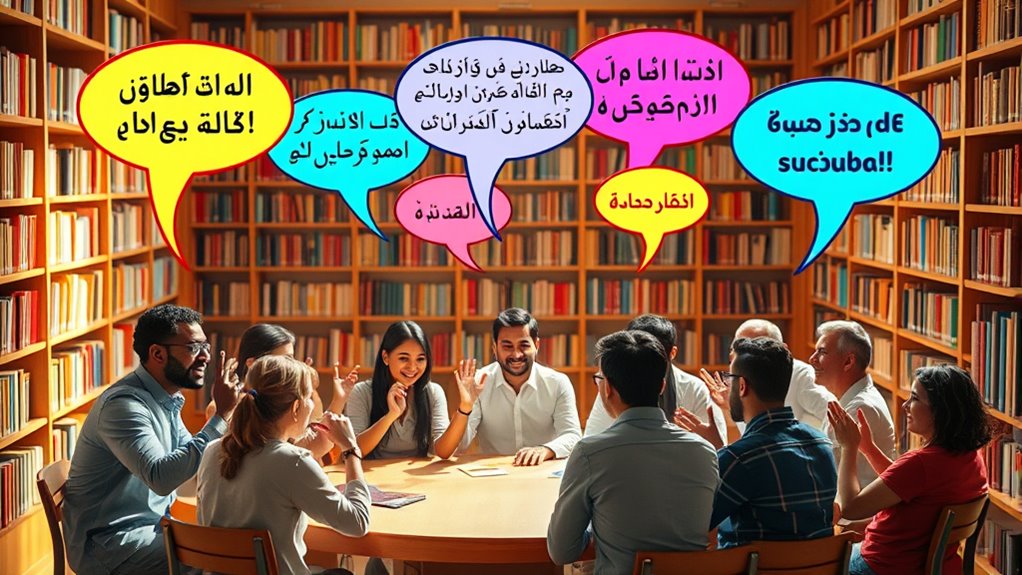Your language shapes how you see and interpret reality by filtering your perception and highlighting certain details while obscuring others. The words you use influence how you categorize experiences, perceive time, space, and emotions, and even how you think about cause and effect. Structure and vocabulary set mental boundaries and cultural frameworks that guide your understanding. To discover more about how language impacts your worldview, keep exploring the connections between words and perception.
Key Takeaways
- Language acts as a lens, filtering perception and emphasizing certain aspects of reality while obscuring others.
- Different vocabulary and grammar structures influence mental categorization and interpretation of experiences.
- Conceptual framing through language guides beliefs, expectations, and behavioral responses.
- Variations in linguistic features shape cognitive boundaries and highlight specific cultural perspectives.
- Recognizing linguistic relativity reveals how language influences our understanding and navigation of the world.

Language and Reality
How does the language we use shape our perception of reality? This question lies at the heart of understanding how linguistic relativity influences the way you think and interpret the world around you. When you communicate, the words and structures you choose do more than just convey facts—they shape your mental landscape through a process called conceptual framing. This framing influences how you categorize experiences, interpret events, and even what you consider possible. Language acts as a lens, filtering your perception and guiding your attention toward certain aspects of reality while obscuring others.
Language shapes perception, framing experience and guiding attention like a lens that highlights some aspects while obscuring others.
Linguistic relativity suggests that the language you speak can impact your cognition, affecting how you perceive time, space, emotions, and even causality. For example, in some languages, there are multiple words for different shades of blue, which makes speakers more attuned to subtle visual distinctions. Similarly, languages that grammatically encode gender or spatial relationships influence how you associate qualities or interpret your environment. This isn’t just about vocabulary—it’s about how the structure of your language constructs mental categories that shape your understanding of the world.
Conceptual framing plays a pivotal role here. Every sentence you construct or interpret carries a set of assumptions that frame your understanding. When you talk about time as a commodity, using phrases like “spending time,” you implicitly frame it as a resource that can be allocated or wasted. Conversely, if you describe time as a flowing river, you conceptualize it as something continuous and unstoppable. These frames influence not only how you think about abstract concepts but also how you prioritize and act upon them. The words you choose set expectations, shape beliefs, and even guide your behavior, often unconsciously.
Your language also influences the scope of your thought. When a culture has specific terms for experiences or objects that others lack, its members tend to think about those experiences more deeply. For instance, some languages have intricate systems for describing kinship or colors, which leads speakers to pay closer attention to those aspects in everyday life. Moreover, new research indicates that cultural intelligence (CQ) can enhance our understanding of how language shapes cross-cultural perceptions and interactions, further emphasizing the importance of linguistic awareness. This illustrates that linguistic relativity isn’t about determining your thoughts but shaping the boundaries within which your thoughts develop. Your language provides the conceptual tools to understand and navigate reality, making it a powerful force in shaping your perception.
Frequently Asked Questions
Can Language Influence Our Perception of Time and Space?
You might find that language influences how you perceive time and space through linguistic relativity and cognitive framing. The words you use can shape your understanding of temporal concepts, like past or future, and spatial relations, such as near or far. By choosing different expressions, you actively mold your perception, showing that language doesn’t just communicate reality—it helps construct your experience of it.
Do Bilinguals Think Differently Depending on the Language They Use?
Thinking as a bilingual is like switching between two maps—you see different routes and landmarks. Your mind adapts based on the language you’re using, showcasing linguistic relativity. This enhances your cognitive flexibility, allowing you to approach problems from varied angles. When you switch languages, your perception shifts subtly, revealing how language influences thought patterns and cultural outlooks, shaping your understanding of the world in unique ways.
How Does Language Shape Cultural Values and Beliefs?
You see, language directly influences your cultural values and beliefs through the concept of linguistic relativity. When you speak a language, it shapes how you perceive the world, reinforcing cultural identity. Words encode shared traditions, norms, and values, which you internalize. As a result, your language acts as a mirror and a mold, guiding your understanding of what’s important and shaping your cultural worldview.
Can Changing Language Alter Our Worldview Over Time?
When you change your language, you can open new doors of perception, shaping your worldview over time. Linguistic relativity suggests that language influences your cognitive frameworks, guiding how you interpret the world. As words evolve, so does your understanding—proving that language is a powerful tool for transformation. You might say, “the pen is mightier than the sword,” but your words could be even more impactful in reshaping your reality.
Are There Universal Concepts That Transcend Linguistic Differences?
You might wonder if universal concepts exist beyond language differences. Linguistic universals suggest that certain ideas, like time or emotion, are shared across cultures. These concepts form foundational conceptual frameworks that transcend linguistic boundaries. While languages vary, humans often perceive fundamental aspects of reality similarly, indicating that some core ideas are universal. Recognizing these helps us understand how diverse languages still connect through shared human experience.
Conclusion
So, next time you describe your world in a certain way, remember—you’re actually shaping it. It’s ironic how your words, meant to reflect reality, can secretly mold your perception of it. You think you’re describing things objectively, but in truth, your language creates a lens that filters everything you see. So, be careful—your words might just be building the very reality you believe you’re simply observing. After all, language isn’t just a mirror; it’s a mold.









